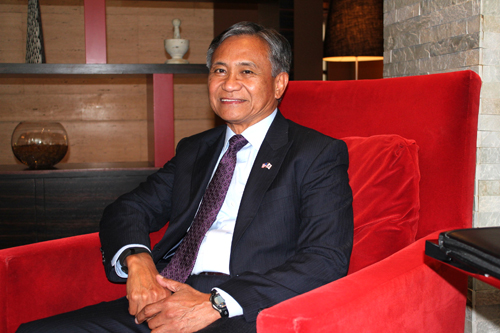By James Tabafunda
Northwest Asian Weekly

Major General Antonio Taguba (Photo by James Tabafunda/NWAW)
After a 34-year career in the military, he had time to think about his next course in life: being a civilian who shares life lessons learned.
Army Maj. Gen. Antonio Taguba, 64, is the second U.S. citizen born in the Philippines to attain the rank of general.
Retired in 2007, he now works as a mentor and serves as an AARP community ambassador, one who is helping Baby Boomers, Generation X and other generations understand family caregiving.
Daphne Kwok, AARP Vice President of Multicultural Markets and Engagement, Asian American and Pacific Islander Audience, said, “We produced ‘Caregiving Dahil Mahal Kita (Because I Love You)’ to help families start the difficult conversations around caregiving for their loved ones.” Taguba is featured in the documentary along with Dolores Velasco, widow of Filipino American civil-rights leader Peter Velasco, and Leo Duran, a Filipino immigrant.
He says the documentary has three family stories that people can relate to. “It has nothing to do with race, your political affiliation. It’s about a fact of life that is going to happen.”
Taguba’s own caregiving story begins at a 2006 family reunion held at his home in Alexandria, Va. His mother, Maria, told the thirty people who attended that she was dying of cancer. “She was 80 years old at the time, so that really shocked us,” he said.
“Sometimes, parents don’t want to relate their medical condition because in our community, they just don’t do that. You don’t want to trouble your kids.” Pride and independence are qualities found in many Filipino Americans.
His 88-year-old father was going through his own medical issues.
A retired Army sergeant, Tomas Taguba served in World War II as a member of the Philippine Scouts. During the Bataan death march in 1942, he escaped capture by the Japanese Imperial Army and fought in the resistance.
The former Maria Batulan died. “And then later, we’re thinking, ‘What are we going to do with dad?’ because he lived three-and-a-half years longer,” retired Maj. Gen. Taguba said.
In the 10-minute documentary, he said about his father, “Dementia was kicking in really bad. He was very combative.”
According to AARP Research, 73 percent of Asian Americans and Pacific Islanders feel that adult children should care for their parents, compared to 49 percent of other Americans.
“We went into crisis mode,” Taguba said. “We did not have a plan. We’re spread across the country: two sisters in Hawaii, two sisters in Arizona, a brother in Texas, a brother in Alabama.” The National Institute on Aging says that as many as seven million Americans fit the definition of long-distance caretakers.
Dealing with his father’s heart disease and dementia combined with the challenges of a career, emotional strain, mental strain, sibling relationships and dealing with his own family created a crisis.
He also said in the documentary, “There’s no cookie-cutter approach to caregiving,” and urges adult children to start the conversation about caregiving when the first opportunity strikes, keep talking about it and don’t ignore it.
“We start by saying, ‘Mom, dad, we really love you. We’ve noticed that you’ve been going to the doctor all the time, what’s wrong?’” Taguba pointed out. “That’s not just one conversation. It would be several conversations.”
Organizing medical and insurance records, getting needed legal documents, and scheduling appointments and medicine usage are just a few of the issues caregivers must include in those conversations.
Taguba said, “Siblings and even relatives will argue about what’s best for your parents. The key feature is that the kids will have to make that determination of what’s best for their mom and dad.”
“My two children (daughter, Lindsay Keys, and son, Sean, an Army captain) are very aware of what my mom and dad had to go through.”
AARP provides online resources that can help both non-members and members make more informed decisions regarding their caretaking plans. He said, “I think every household should have a copy of this (the AARP booklet, ‘Prepare to Care’).”
For those without a computer and Internet access, Taguba also recommends calling the local AARP office in Seattle.
According to the AARP report “Caregiving Among Asian Americans and Pacific Islanders Age 50+,” to live a quality life, Filipino Americans believe in having peace of mind.
“Peace of mind would be, as you’re retiring, somebody is actually taking care of you,” he said. “Peace of mind means that I did the best that I can for mom and dad.” (end)
To view the documentary, go to www.aarp.org/aapi. For more information about the AARP Caregiving Resource Center, go to www.aarp.org/home-family/caregiving/planning-and-resources/.
James Tabafunda can be reached at info@nwasianweekly.com.

